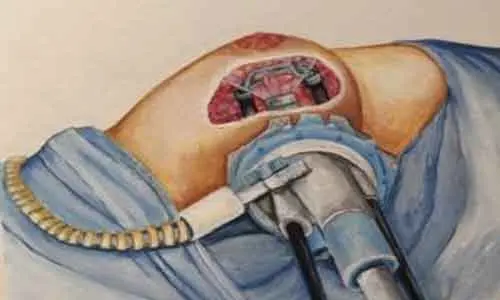- Home
- Medical news & Guidelines
- Anesthesiology
- Cardiology and CTVS
- Critical Care
- Dentistry
- Dermatology
- Diabetes and Endocrinology
- ENT
- Gastroenterology
- Medicine
- Nephrology
- Neurology
- Obstretics-Gynaecology
- Oncology
- Ophthalmology
- Orthopaedics
- Pediatrics-Neonatology
- Psychiatry
- Pulmonology
- Radiology
- Surgery
- Urology
- Laboratory Medicine
- Diet
- Nursing
- Paramedical
- Physiotherapy
- Health news
- Fact Check
- Bone Health Fact Check
- Brain Health Fact Check
- Cancer Related Fact Check
- Child Care Fact Check
- Dental and oral health fact check
- Diabetes and metabolic health fact check
- Diet and Nutrition Fact Check
- Eye and ENT Care Fact Check
- Fitness fact check
- Gut health fact check
- Heart health fact check
- Kidney health fact check
- Medical education fact check
- Men's health fact check
- Respiratory fact check
- Skin and hair care fact check
- Vaccine and Immunization fact check
- Women's health fact check
- AYUSH
- State News
- Andaman and Nicobar Islands
- Andhra Pradesh
- Arunachal Pradesh
- Assam
- Bihar
- Chandigarh
- Chattisgarh
- Dadra and Nagar Haveli
- Daman and Diu
- Delhi
- Goa
- Gujarat
- Haryana
- Himachal Pradesh
- Jammu & Kashmir
- Jharkhand
- Karnataka
- Kerala
- Ladakh
- Lakshadweep
- Madhya Pradesh
- Maharashtra
- Manipur
- Meghalaya
- Mizoram
- Nagaland
- Odisha
- Puducherry
- Punjab
- Rajasthan
- Sikkim
- Tamil Nadu
- Telangana
- Tripura
- Uttar Pradesh
- Uttrakhand
- West Bengal
- Medical Education
- Industry
Bilateral mastectomy effective in preventing contralateral spread for unilateral breast cancer patients: Study

A new study published in the Journal of American Medical Association shows that despite contralateral mastectomy is a successful cancer preventive strategy for unilateral breast cancer, it does not lower the chance of breast cancer-related death or raise concerns about the possibility of a de novo contralateral cancer spreading.
Bilateral mastectomy is the treatment of choice for many women with unilateral breast cancer because it is believed to be the most effective way to stop the growth of another breast tumor and lower their chance of mortality. This study indicated that removing an undamaged breast lowers the risk of developing a second breast cancer, but no studies have shown that this lowers the death rate from breast cancer. Thus, this study by Vasily Giannakeas and colleagues was set to calculate the 20-year cumulative risk of breast cancer mortality in women who had unilateral breast cancer ranging from stage 0 to stage III based on the kind of first surgery that was done.
This cohort analysis identified women diagnosed between 2000 and 2019 with unilateral breast cancer (invasive and ductal carcinoma in situ) using the Surveillance, Epidemiology and End Results (SEER) Program registry database. Using 1:1:1 matching, three tightly matched cohorts of similar size were produced based on the surgical technique. For 20 years, the cohorts were monitored for breast cancer mortality and contralateral breast cancer. The 20-year cumulative risk of breast cancer mortality for women treated with lumpectomy versus unilateral mastectomy or bilateral mastectomy was evaluated in the research.
A total of 661,270 women with unilateral breast cancer were included in the research sample. Following matching, the three treatment groups comprised close to 36,028 women respectively.
20-year follow-up revealed 766 contralateral breast cancers in the group that had a lumpectomy, 728 contralateral breast cancers in the group that had a unilateral mastectomy and 97 contralateral cancers in the group that had a bilateral mastectomy. In the lumpectomy-unilateral mastectomy group, the 20-year risk of contralateral breast cancer was 6.9%.
By 15 years following the development of a contralateral cancer, the cumulative breast cancer mortality was 32.1% and for the individuals who did not get a contralateral cancer, it was 14.5%. 37 women in the lumpectomy group, 36 women in the unilateral mastectomy category and 36 women in the bilateral mastectomy category died of breast cancer.
Overall, bilateral mastectomy lowered the risk of contralateral breast cancer when compared to other surgical treatments. The outcomes of this research found no difference in mortality between bilateral mastectomy, lumpectomy, and unilateral mastectomy.
Reference:
Giannakeas, V., Lim, D. W., & Narod, S. A. (2024). Bilateral Mastectomy and Breast Cancer Mortality. In JAMA Oncology. American Medical Association (AMA). https://doi.org/10.1001/jamaoncol.2024.2212
Neuroscience Masters graduate
Jacinthlyn Sylvia, a Neuroscience Master's graduate from Chennai has worked extensively in deciphering the neurobiology of cognition and motor control in aging. She also has spread-out exposure to Neurosurgery from her Bachelor’s. She is currently involved in active Neuro-Oncology research. She is an upcoming neuroscientist with a fiery passion for writing. Her news cover at Medical Dialogues feature recent discoveries and updates from the healthcare and biomedical research fields. She can be reached at editorial@medicaldialogues.in
Dr Kamal Kant Kohli-MBBS, DTCD- a chest specialist with more than 30 years of practice and a flair for writing clinical articles, Dr Kamal Kant Kohli joined Medical Dialogues as a Chief Editor of Medical News. Besides writing articles, as an editor, he proofreads and verifies all the medical content published on Medical Dialogues including those coming from journals, studies,medical conferences,guidelines etc. Email: drkohli@medicaldialogues.in. Contact no. 011-43720751


